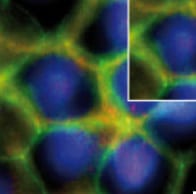 Measurement of ion flow across epithelial tissue such as the gastrointestinal tract is a highly relevant parameter for assessing the function or health of the tissue and has been demonstrated to be an excellent way to show infection or damage of such tissues by pathogens or toxins. Previously, accurate assessment of the health of epithelial tissue in vitro was not an option for applications such as toxicology or diagnostics which require high-throughput analysis, due to limitations in technology and high cost.
Measurement of ion flow across epithelial tissue such as the gastrointestinal tract is a highly relevant parameter for assessing the function or health of the tissue and has been demonstrated to be an excellent way to show infection or damage of such tissues by pathogens or toxins. Previously, accurate assessment of the health of epithelial tissue in vitro was not an option for applications such as toxicology or diagnostics which require high-throughput analysis, due to limitations in technology and high cost.
The emergence of organic electronics, that provides the potential of low-cost, disposable sensors, has opened the door for the use of devices such as the organic electrochemical transistor integrated with live cells, for toxicology and diagnostics applications. With this in mind, researchers have demonstrated the feasibility of using an organic transistor integrated with a human intestinal cell-line for detecting a food-borne enteric pathogen, Salmonella typhimurium, one of the leading causes of food-borne disease. Their solution works by dynamically measuring changes in ion flow of epithelial tissue provoked by the bacteria. The research shows long-term operation of the device under physiological conditions, and further that the device is capable of operating in complex matrices such as milk, showing particular promise for food and safety applications.

















